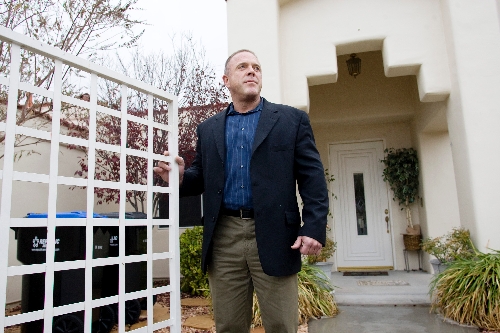Report: Las Vegas home prices rising
Las Vegas ranked as the No. 3 market in the nation for home price gains in November, defying predictions that prices would decline further during the normally slow period of the year, real estate brokerage Re/Max reported Friday.
A survey of 54 metropolitan areas showed Las Vegas home prices increased 4.7 percent in November from the previous month. Jackson, Miss., and Billings, Mont., shared the top spot with a 9.2 percent monthly increase, followed by Las Vegas; Birmingham, Ala. (3.8 percent); and Miami (3.6 percent).
"Despite predictions about falling home prices, they appear to be remaining stable with several markets reporting significant price increases over last year," Re/Max Chief Executive Officer Margaret Kelly said.
The housing market is still struggling to find "secure footing," she said. Several outside forces have created uncertainty in the real estate market, including the homebuyer tax credit that expired in April and the foreclosure moratorium imposed by major lenders in October.
Home sales fell 4.9 percent from October and 25.9 percent from November 2009. However, they appear to be recovering, with much smaller declines than previous months.
"While home sales usually decline in the winter months, we are seeing a larger-than-normal correction this winter due to several artificial factors like the expired tax credit," Kelly said.
Las Vegas-based Residential Resources reported 2,741 single-family home closings in November, a 7.2 percent increase from October and 10.2 percent decrease from the same month a year ago. The median price increased slightly to $135,000 and real estate-owned, or bank-owned, closings held steady at $120,000.
Mark Stark, president of Prudential Americana Group in Las Vegas, said he's seen an uptick within his organization in the last month. He plans to keep a close watch on the market in the first quarter, particularly the mix of property types that are selling.
"You have to be careful not to generalize the market," Stark said. "The market will have some homes appreciate, some homes stay flat and others drop dramatically. It all depends on location, product type, price level and amenities."
Although many real estate analysts still expect price corrections, Re/Max's November housing report suggests that prices are stabilizing, down an average of 1.7 percent from last year. The median sales price in November was $195,351, compared with $198,863 a year ago.
Of the 54 markets surveyed, 36 showed year-over-year price increases, led by Burlington, Vt. (17.2 percent); Trenton, N.J. (15.9 percent); Raleigh, N.C. (13.3 percent); Washington, D.C. (9.4 percent); and Boston (8.8 percent).
Housing inventory continued a trend of single-digit decline, dropping 4.6 percent from October and 2.3 percent from November 2009. Average months supply of inventory is about 10 months.
What helps push Las Vegas prices back up is the breakdown between foreclosures, short sales and "classic sales," or sales of nondistressed homes, Prudential Americana Group Chief Operating Officer Gordon Miles said.
Whereas foreclosures once made up about 80 percent of Las Vegas home sales, they're now down to roughly 40 percent. Short sales, or lender-approved sales for less than the principal mortgage balance, have increased to about 30 percent of the market.
Rick Phillips, president and chief investment officer of Main Street Capital Advisors in Las Vegas, said real estate prices are still down a little from October's numbers.
The recent run-up in mortgage interest rates from about 4.25 percent to slightly over 5 percent on a 30-year fixed-rate mortgage will increase monthly payments for principal and interest by about 10 percent, Phillips calculated.
"We think that will have a dampening effect on prices going forward, but it might spur some people to buy if they feel rates are going to go up even more with what's going on with the economy around the nation improving a little bit," Phillips said. "We hear that prices have probably bottomed, depending on the segment of the market."
Housing has become much more affordable with low interest rates and reduced home prices, which will lead to a 4 percent increase in U.S. household formation, said John Duca, vice president of the Federal Reserve Bank of Dallas.
Grown children moved back in with their parents during the Great Recession. As their job situation improves, they'll be moving out again "for the sake of sanity for both the parents and children," Duca said Wednesday at the Southern Nevada Economic Outlook.
Contact reporter Hubble Smith at hsmith@reviewjournal.com or 702-383-0491.























